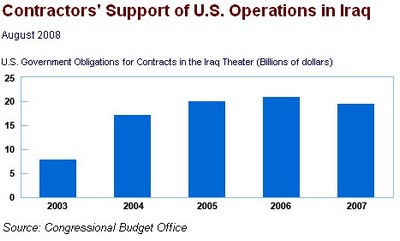CBO Report Tallies Expenditures on Contracting in Iraq
by Craig Jennings, 8/12/2008
 In response a requrest from the Senate Budget Committee, CBO has a issued a report on contractors working in Iraq. From 2003 to 2007, the federal government awarded over $85 billion in contracts, and with a burn rate of $17-21 billion per year, it's likely that $100 has been doled out to private contractors since the start of the war.
In response a requrest from the Senate Budget Committee, CBO has a issued a report on contractors working in Iraq. From 2003 to 2007, the federal government awarded over $85 billion in contracts, and with a burn rate of $17-21 billion per year, it's likely that $100 has been doled out to private contractors since the start of the war.
The report is thorough analysis of on what and by whom that money is being spent. CBO sliced the data by:
- Which federal agency is awarding contracts (The DoD has awarded $76 billion in contracts with the Army obligating 75 percent of that amount)
- Location of where contract was performed ($63 billion in Iraq, $14 billion in Kuwait, and $8 billion in other countries in the Iraq theater*)
- The types of products and services provided by contractors (about $25 for Professional, Administrative, and Management Support, $20 billion for Uncategorized or Miscellaneous, with the rest falling in some 97 other categories)
CBO's report also quantifies the extent to which contractor personnel are in theater. CBO estimates that there are some 190,000 people working for contractors in the Iraq theater, of which about 20 percent are U.S. citizens. In fact, the ratio of contract personnel to military is 1 to 1 -- a level some 3.9 times higher than the historical average.
Upon the release of the report Senate Budget Committee Chair Kent Conrad (D-ND) issued a press release summarizing the potential pitfalls of outsourcing on such a massive scale:
There are billions of taxpayer dollars being funneled to both American and foreign companies, often through no-bid contracts. Ongoing Pentagon audits have revealed that vast sums of this money have been misspent or improperly recorded. The American people deserve a better accounting from this Administration of who these contractors are, why they are being used instead of U.S. troops, how they are being monitored, and whether they represent a cost-effective use of American resources.

*A region in the Middle East including Iraq, Bahrain, Jordan, Kuwait, Oman, Qatar, Saudi Arabia, Turkey, and the United Arab Emirates



